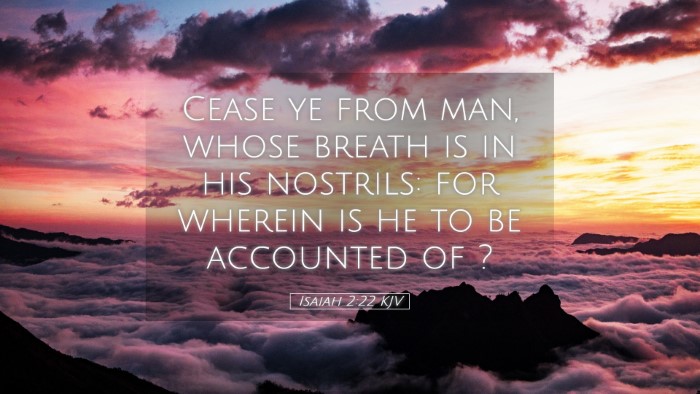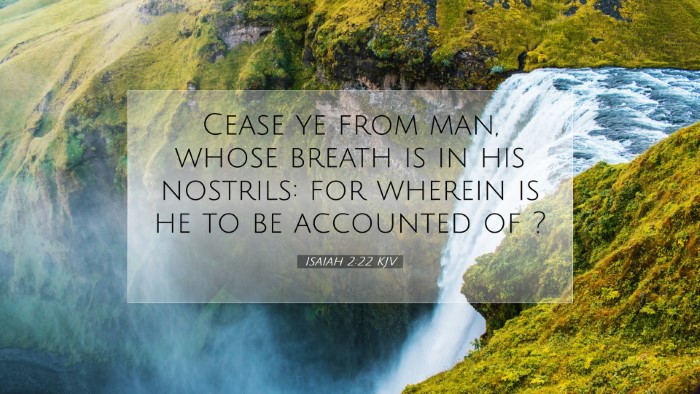Commentary on Isaiah 2:22
This passage from the Book of Isaiah serves as a critical reflection on human reliance and the futility of trusting in man over God. Various public domain commentaries provide rich insights that enhance our understanding of this verse.
Text of Isaiah 2:22
"Cease ye from man, whose breath is in his nostrils: for wherein is he to be accounted of?"
Contextual Analysis
Isaiah prophesies during a time of great turmoil and moral decay in Judah. The words in this verse call for a reassessment of priorities, particularly the reliance on human authority and strength.
Matthew Henry's Commentary
Matthew Henry emphasizes the brevity and weakness of human existence in this verse. He asserts that relying on people is futile because their lifebreath is fleeting and fragile. Henry writes:
- Human Frailty: He highlights that man is but a creature with ephemeral breath, prone to vanity and can be admired for only a short span of time.
- Tendency Towards Idolatry: The verse points to the foolishness of turning to men and their institutions for wisdom and support, which should only be found in God.
- Call to Dependence on God: Henry concludes that the passage is a divine invitation to place trust in God alone, who is sovereign, eternal, and steadfast.
Albert Barnes' Notes
Albert Barnes takes a slightly different approach, focusing on the implications of this verse for the people of Judah:
- Critique of Worldly Alliances: Barnes points out that Isaiah warns against placing trust in alliances with powerful nations or leaders, as they are as mortal as anyone.
- Nature of Man's Breath: He elucidates that 'breath' symbolizes life itself, showcasing that man’s existence is inherently transient and thus unworthy of lifelong trust.
- Exhortation to Divine Assurance: The commentary urges believers to seek assurance and support from God, who reigns eternally and provides true refuge in perilous times.
Adam Clarke's Commentary
Adam Clarke’s insights delve into the theological significance of the verse:
- The Impermanence of Human Power: Clarke notes that all human power and wisdom are temporary and ultimately ineffective in the grand scheme of God’s plan.
- Existential Reflection: The admonition to 'cease from man' is a profound call to discern who should be the object of one’s faith and hope.
- Call to Authenticity: He emphasizes the direction toward genuine faith and reliance on God, which transcends worldly wisdom.
Theological Implications
This verse serves as a powerful reminder of the need for believers to evaluate their sources of hope and strength. The collective insights from these commentaries inform various theological reflections:
- Human Limitations: The acknowledgment that all humans are limited in wisdom and ability encourages humility and dependence on God.
- Trust in God’s Sovereignty: This passage reinforces that ultimate authority lies with God, who is infinite and unchanging.
- Faith Over Fear: In times of uncertainty, believers are encouraged to prioritize faith in God over fear caused by external pressures.
Practical Applications
The ecclesiastical implications of Isaiah 2:22 are profound:
- Encouragement for the Congregation: Pastors are reminded to guide their communities toward a reliance on God's promises rather than transient human assurances.
- Leaders in Ministry: Ministry leaders should practice humility and look to God for direction, rejecting the temptation to consider human wisdom as paramount.
- Personal Reflection: Individual believers are invited to assess their own dependencies and consider if they are placing more trust in human relationships, positions, or teachings rather than divine revelation.
Conclusion
In sum, Isaiah 2:22 serves as a critical reminder of the temporary nature of humanity and the essentiality of turning one’s focus toward divine strength and stability. Insights from Matthew Henry, Albert Barnes, and Adam Clarke collectively underscore the permanence of God’s kingdom versus the fleeting nature of human endeavors. For pastors, theologians, and scholars, this verse calls for an ongoing commitment to authentic faith, recognition of human limitations, and a clearer understanding of divine sovereignty.


